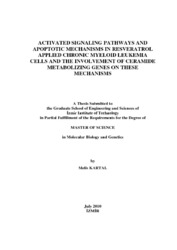Please use this identifier to cite or link to this item:
https://hdl.handle.net/11147/3515Full metadata record
| DC Field | Value | Language |
|---|---|---|
| dc.contributor.advisor | Baran, Yusuf | en |
| dc.contributor.author | Kartal Yandım, Melis | - |
| dc.date.accessioned | 2014-07-22T13:51:43Z | - |
| dc.date.available | 2014-07-22T13:51:43Z | - |
| dc.date.issued | 2010 | en |
| dc.identifier.uri | http://hdl.handle.net/11147/3515 | - |
| dc.description | Thesis (Master)--Izmir Institute of Technology, Molecular Biology and Genetics, Izmir, 2010 | en |
| dc.description | Includes bibliographical references (leaves: 49-58) | en |
| dc.description | Text in English; Abstract: Turkish and English | en |
| dc.description | xiii, 58 leaves | en |
| dc.description.abstract | Resveratrol, an important phytoalexin in many plants, has cytotoxic effects on several cancer cells. Ceramide is a significant sphingolipid which affects many signaling pathways regulating cell senescence, migration, and cell cycle arrest. Intracellular ceramide level is balanced by glucosylceramide synthase (GCS), the converter of ceramide to glucosylceramide, and sphingosine kinase-1 (SK-1) that convert ceramide to sphingosine 1-phosphate (S1P). Ceramide functions as an apoptotic molecule whereas glucosylceramide S1P function as anti-apoptotic. An important cell-permeable analogue of natural ceramides, C8:ceramide, increases intracellular ceramide levels significantly, while 1-phenyl-2-decanoylamino-3-morpholino-1-propanol (PDMP) and SK-1 inhibitor increase accumulation of ceramides by inhibiting GCS and SK-1, respectively. Chronic myelogenous leukemia (CML), a hematological disorder, results from the generation of BCR/ABL oncogene. In this study, we examined the roles of ceramide metabolizing genes in resveratrol-induced apoptosis, and the expression profiles of 84 genes underlying apoptosis, cell cycle control, DNA damage repair, and invasion and metastasis in human K562 CML cells treated with resveratrol. There were synergistic cytotoxic and apoptotic effects of resveratrol with coadministration of C8:ceramide, PDMP and SK-1 inhibitor. We observed significant increases in expression levels of LASS genes, and decreases in expression levels of GCS and SK-1 in K562 cells in response to increasing concentrations of resveratrol. There were also significant increases in the expression levels of SERPINB5, FAS, TNFRSF, MTSS that are related with tumor suppression, and decreases in Myc expression. Our data, in total, showed for the first time that resveratrol might kill CML cells through increasing intracellular generation and accumulation of apoptotic ceramides. | en |
| dc.language.iso | en | en_US |
| dc.publisher | Izmir Institute of Technology | en |
| dc.rights | info:eu-repo/semantics/openAccess | en_US |
| dc.subject.lcsh | Chronic lymphocytic leukemia | en |
| dc.subject.lcsh | Resveratrol--Health aspects | en |
| dc.subject.lcsh | Ceramides | en |
| dc.title | Activated signaling pathways and apoptotic mechanisms in resveratrol applied chronic myeloid leukemia cells and the involvement of ceramide metabolizing genes on these mechanisms | en_US |
| dc.type | Master Thesis | en_US |
| dc.institutionauthor | Kartal Yandım, Melis | - |
| dc.department | Thesis (Master)--İzmir Institute of Technology, Molecular Biology and Genetics | en_US |
| dc.relation.publicationcategory | Tez | en_US |
| item.languageiso639-1 | en | - |
| item.fulltext | With Fulltext | - |
| item.openairecristype | http://purl.org/coar/resource_type/c_18cf | - |
| item.openairetype | Master Thesis | - |
| item.grantfulltext | open | - |
| item.cerifentitytype | Publications | - |
| Appears in Collections: | Master Degree / Yüksek Lisans Tezleri | |
Files in This Item:
| File | Description | Size | Format | |
|---|---|---|---|---|
| T000833.pdf | MasterThesis | 1.22 MB | Adobe PDF |  View/Open |
CORE Recommender
Page view(s)
260
checked on Jul 22, 2024
Download(s)
90
checked on Jul 22, 2024
Google ScholarTM
Check
Items in GCRIS Repository are protected by copyright, with all rights reserved, unless otherwise indicated.